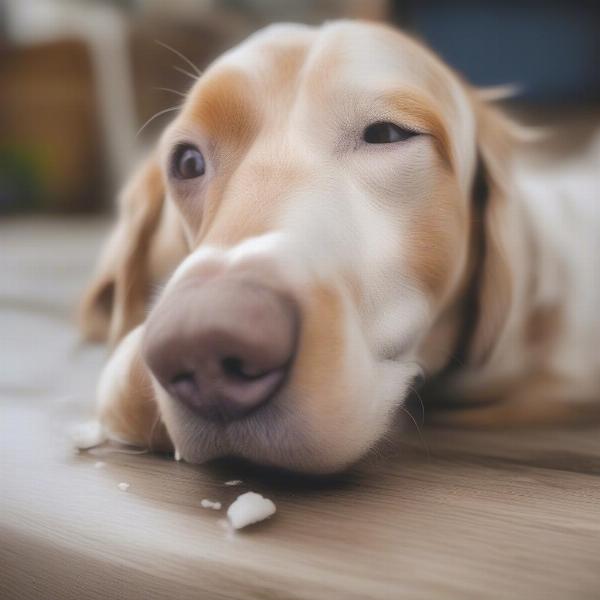If your dog ate goose poop, you’re likely feeling a mix of disgust and concern. It’s a common canine behavior, though not exactly appealing to us humans. This article will delve into the reasons behind this habit, potential health risks, and what you should do if your furry friend decides goose droppings are a delicacy.
Why Do Dogs Eat Goose Poop?
Dogs have a different palate than we do. What might seem repulsive to us can be quite enticing to them. Several reasons contribute to this peculiar behavior:
- Coprophagy: The technical term for eating feces, coprophagy can stem from dietary deficiencies, boredom, or even just plain curiosity, especially in puppies. While goose poop isn’t dog poop, the instinct can overlap.
- Nutritional Deficiency: Although unlikely, goose poop might contain traces of undigested nutrients that attract some dogs. This is more common if your dog’s diet is lacking in essential vitamins or minerals.
- Boredom or Anxiety: Dogs, especially those left alone for extended periods, might engage in poop-eating out of boredom or anxiety. It’s a way to occupy themselves, even if it’s with something unpleasant.
- Strong Scent: Goose poop has a pungent odor, and dogs rely heavily on their sense of smell. This strong aroma might simply be irresistible to some dogs.
Potential Health Risks of Eating Goose Poop
While a single incident of goose poop consumption might not cause significant harm, there are some potential health risks to be aware of:
- Parasites: Goose poop can harbor parasites like Giardia and Coccidia, which can cause diarrhea, vomiting, and weight loss in dogs.
- Bacteria: Harmful bacteria like Salmonella and Campylobacter can be present in goose droppings, leading to gastrointestinal infections.
- Toxins: Depending on the goose’s diet, their poop could contain toxins from pesticides or herbicides, which can be harmful to dogs if ingested.
 Dog with Upset Stomach After Eating Goose Poop
Dog with Upset Stomach After Eating Goose Poop
What to Do if Your Dog Ate Goose Poop
If your dog ate goose poop, monitor them closely for any signs of illness, such as:
- Vomiting
- Diarrhea
- Loss of appetite
- Lethargy
If your dog exhibits any of these symptoms, contact your veterinarian immediately. They may recommend a fecal exam to check for parasites or other infections.
Preventing Your Dog from Eating Goose Poop
The best way to deal with this problem is to prevent it from happening in the first place:
- Muzzle Training: A muzzle can prevent your dog from accessing goose poop while still allowing them to enjoy walks and playtime.
- “Leave It” Command: Training your dog to respond to the “leave it” command is crucial. This requires consistent practice and positive reinforcement.
- Distraction Techniques: Carry high-value treats or toys to distract your dog when you see goose poop.
- Environmental Management: Try to avoid areas known for high goose populations, especially if your dog has a history of eating poop.
Conclusion
While seeing your dog eat goose poop can be distressing, it’s a relatively common behavior. Understanding the reasons behind it and taking preventative measures can minimize the risk to your dog’s health. If your dog shows any signs of illness after consuming goose poop, consult your veterinarian immediately.
FAQ
- Is goose poop toxic to dogs? While not inherently toxic, it can contain harmful bacteria and parasites.
- Why is my dog attracted to goose poop? It could be due to coprophagy, nutritional deficiencies, boredom, or the strong scent.
- How can I stop my dog from eating goose poop? Muzzle training, the “leave it” command, distraction techniques, and environmental management can help.
- Should I be concerned if my dog ate a small amount of goose poop? While a small amount might not cause harm, monitor your dog for any signs of illness.
- What are the signs of illness after eating goose poop? Vomiting, diarrhea, loss of appetite, and lethargy.
Related Articles:
About ILM Dog:
ILM Dog is your trusted source for expert advice on all aspects of dog care, from breed selection and puppy care to senior dog health and training. We offer valuable resources on nutrition, grooming, and even traveling with your canine companion. We’re dedicated to helping you provide the best possible care for your beloved furry friend. For personalized guidance and support, contact us at [email protected] or call us at +44 20-3965-8624. Visit ILM Dog today for more information!